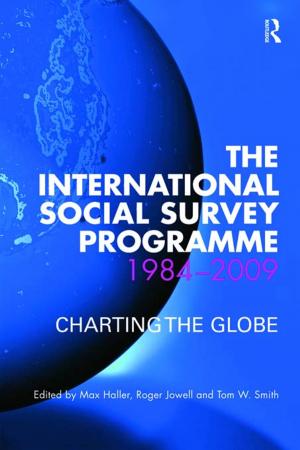Security, Emancipation and the Politics of Health
A New Theoretical Perspective
Nonfiction, Social & Cultural Studies, Social Science, Sociology, Political Science| Author: | Joao Nunes | ISBN: | 9781134578504 |
| Publisher: | Taylor and Francis | Publication: | October 1, 2013 |
| Imprint: | Routledge | Language: | English |
| Author: | Joao Nunes |
| ISBN: | 9781134578504 |
| Publisher: | Taylor and Francis |
| Publication: | October 1, 2013 |
| Imprint: | Routledge |
| Language: | English |
This book develops a new theoretical framework for the study of security issues and applies this to the case of health.
Building on the work of the ‘Welsh School’ of Security Studies, and drawing on contributions from the wider critical security literature, the book provides an emancipatory perspective on the health-security nexus – one which simultaneously teases out its underlying political assumptions, assesses its political effects and identifies potential for transformation.
Security, Emancipation and the Politics of Health challenges conventional wisdom in the field of health and international politics by conceiving of health as a fundamentally political issue, and not merely as a medical problem demanding ‘technical’ solutions and arrangements. The book shows how political processes of representation underpin notions of health and disease through an examination of three key areas: the linkages between immigration and the fear of disease; colonial medicine; and the ‘health as a bridge for peace’ literature. In order to successfully carry out this political investigation of health, the book develops an innovative theoretical framework inspired by the idea of ‘security as emancipation’, which goes beyond the existing emancipatory literature in security studies.
This book will be of much interest to students of critical security studies, health politics, sociology and IR in general.
This book develops a new theoretical framework for the study of security issues and applies this to the case of health.
Building on the work of the ‘Welsh School’ of Security Studies, and drawing on contributions from the wider critical security literature, the book provides an emancipatory perspective on the health-security nexus – one which simultaneously teases out its underlying political assumptions, assesses its political effects and identifies potential for transformation.
Security, Emancipation and the Politics of Health challenges conventional wisdom in the field of health and international politics by conceiving of health as a fundamentally political issue, and not merely as a medical problem demanding ‘technical’ solutions and arrangements. The book shows how political processes of representation underpin notions of health and disease through an examination of three key areas: the linkages between immigration and the fear of disease; colonial medicine; and the ‘health as a bridge for peace’ literature. In order to successfully carry out this political investigation of health, the book develops an innovative theoretical framework inspired by the idea of ‘security as emancipation’, which goes beyond the existing emancipatory literature in security studies.
This book will be of much interest to students of critical security studies, health politics, sociology and IR in general.















